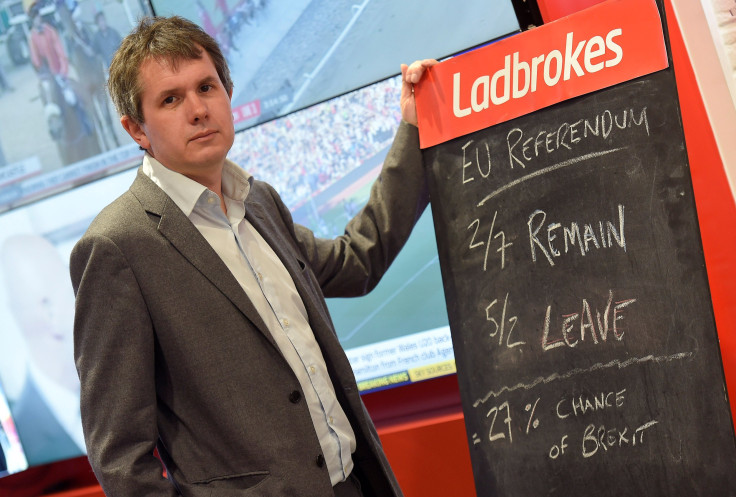Brexit Vote 2016: Big Bettors In EU Referendum Have Leg Up On Pollsters In Predicting June 23 Outcome

If punters prevail over pollsters, then Britons surely shan’t vote for Brexit.
Britain’s betting markets, where gamblers wager on soccer's World Cup and other global happenings, are humming like never before. The amount of money wagered on the outcome of next Thursday's EU referendum is smashing records set in the Scottish independence referendum of 2014 and the 2015 British general election.
And the bettors as a whole — led by a single person who laid down 315,000 pounds ($452,088) on Britain remaining — tell a far different story than opinion surveys suggesting Britons are poised to bail on the EU, an effect more pronounced since Thursday’s killing of Jo Cox, a member of Parliament.
Those who vote with notes not ballots believe the country won’t take that fateful leap when British subjects cast their votes. They have rated the chance for a Brexit, as it’s become known, at no more than 40 percent for the duration of the campaign because they’re convinced far fewer people will abandon the EU than the polls suggest.
The polls give a snapshot of the electorate’s feelings today. But punters believe they know how voters will feel next Thursday.
“At the end, the polling overstates the eagerness for change,” said Leighton Vaughan Williams, a professor of finance and economics at Nottingham Trent University. “There’s a late swing, of those who actually vote, to the status quo.”
The fatal shooting and stabbing of Cox, a pro-EU Labour member of Parliament, has only strengthened this assessment, as the probability of Brexit has declined to about 33 percent from about 40 only a day before, according to the wagering site Betfair. “I can’t recall any single event having such a dramatic effect on the betting markets during a political campaign,” Vaughan Williams said.
This stark contrast between the betting markets and the polls highlights the influence gamblers have come to have on predicting future political events in Britain. With strong track records in events such as the Scottish independence referendum in 2014 and the surprise victory of conservative Prime Minister David Cameron a year later, online gamblers have become a collective benchmark for professional seers.
In their regular research reports to clients, a striking number of economists and investment banks now reality check their assessment with Britain’s vibrant political betting markets, or use them to justify their own prognoses. Alan Houmann, head of government affairs for Europe, the Middle East and Africa at Citigroup, said the global bank recently revised its assessment of the likelihood of Brexit to “the top end” of the 30- to 40 percent range.
“It’s pretty much near where the betting markets are at,” Houmann said.
Even for sites that do most of their business in the sports book, Brexit has proved an unexpected fillip to the bottom line.
“Turnover is booming,” said Matthew Sharpe, a spokesman for William Hill, a prominent betting firm.
The online site Betfair will likely hit 50 million pounds in bets before the polls open, spokeswoman Naomi Totten said. That will outstrip no less than the 2014 World Cup final soccer match between Germany and Argentina.
The Brexit referendum itself has also become a natural experiment for researchers like Vaughan Williams, who study whether betting markets can provide more insight than widely publicized opinion surveys. In particular, the Brexit referendum will test the thesis of whether the bettors who have more money and expect Britain to remain in the EU possess an understanding of the electorate that is beyond the ken of the much more numerous gamblers who are betting it will leave.
About 25 percent of the gamblers wager about 75 percent of the money with the major betting firms, and precisely the reverse is true: About three quarters of the individual bettors put up a quarter of the cash, noted Daniel Vernazza, an economist with UniCredit in London.
“Are they smart money?” Vernazza asked. “I guess we’ll find out”

Vaughan Williams, the Nottingham professor, has found the answer is yes.
In a recently published paper, he studied how prediction markets, as betting exchanges are known to economists, fared in a clutch of American elections. They found the markets outperformed polls, with the key difference being that large-scale bettors scrutinized reams of evidence before laying down any cash.
“It’s the weight of money that’s more accurate in predicting the outcome,” Vaughan Williams said. “It’s not the number of people.”
It’s hard to imagine a more vivid demonstration of this academic conclusion than the successful 900,000-pound bet that Scots would not vote leave the United Kingdom in their 2014 referendum.
The anonymous man who made this mighty wager and earned about 200,000 pounds on it — that’s a princely annual return of 22 percent — delved deeply into the copious information available.
“What blew my mind was the amount of data available. Poll after poll after poll asking every possible question across generations,” the man told the BBC, shielding his identity all the while. “You have an exact insight into what is important to local Scots. You can look at this data and make some interesting predictions, which is what I did.”
The contrast among the vast majority of bettors is striking.
Small-time punters who lay down a few pounds on the side they favor tend to do it for fun, according to Vaughan and people who work at betting sites. They make the wager, and leave the rest to the gods.
The nature of some of the betting sites also invites a closer look at events besides the simple question of which side will prevail, and that’s something sophisticated gamblers tend to do, points out Naomi Totton, a spokeswoman for Betfair, a leading online market. For example, gamblers can bet on voter participation in the referendum, and they can move in and out of their bets in the days leading up to the vote.
“Somebody who makes bigger bets looks harder and those sorts of things in the market, not only who will win,” Totten said.
The anonymous man who wagered 900,000 pounds also scrutinized the historical precedents, like a 1995 referendum in Quebec, in which separatists favoring independence from Canada took the lead in surveys going into the day of the polling, but then lost in a stunning reverse. That let him sleep easier the night before the Scottish vote.
Wittingly or not, the man tapped into a central insight of researchers about major votes, whether in Britain or elsewhere.
Undecided and wavering voters tend “overwhelmingly” to vote for the status quo, for “the least risky option,” said Matthew Shaddick, head of politics trading at Ladbrokes, another betting firm. It’s often expressed in Britain with the old saw, “Better the devil you know than the devil you don’t know.”
“‘Leave’ needs to be well ahead at this stage in order to have any chance of winning, unless they can convince voters that staying in the EU is riskier than leaving,” Shaddick said. “That’s not going to be an easy sell when most of the nation’s political parties and representatives of big business are mostly saying the opposite.
© Copyright IBTimes 2024. All rights reserved.











